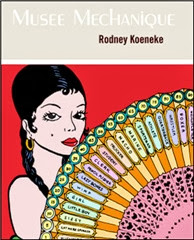 Philip Metres
Philip Metres and I have been talking
through his blog about
Tom Raworth and his famous reading speed. Metres mentions Raworth’s lightning pace as a “counterpoint” to the lines as they appear on the page, and cites “Listen Up,” a satiric poem in end-rhymed couplets, to make a comparison with
Tony Harrison’s “working class political aesthetic” and, inevitably, hip hop.
But what got me thinking about the exchange with Metres was how much meaning we were willing to squeeze out of Raworth’s speed without any reference to his poems at all. If you didn’t know the lines were often Creeley-skinny in print, or he didn’t happen to be reading in rhymed couplets, his delivery alone invites interpretations, independently of any of the formal features of his work, that say a lot about the hopes and assumptions many of us bring to contemporary poetry.
I don’t really believe you can “read” Raworth’s speed by itself, and the possibilities below all show signs of knowing more about Raworth than just his reading style—that he’s British, for instance, or that a “working class political aesthetic” might be relevant. But I think our tendency to mask this essential contextual knowledge in a discussion of a “poetics of speed”—our need to find a poetics in even a manner of reading—reveals something crucial, or at least symptomatic, about the state of the art, and the pressure we put on it to effect change.
Here are a few readings Metres and I turned up. Others? And any explanations for why we’re doing this at all?
+ Raworth’s speed as a way to “[destroy] the polite conventions of the traditional poetry reading.”
+ Speedy delivery as a means for pushing words closer to “the status of pure signifiers, disconnected from any system of meaning but the sounds themselves.”
+ Reading fast as a Wallace Stevens-like “‘pushing back’ against the pressure of reality.”
+ Quick reading of short lines as Raworth’s reaction to Creeley’s (mis)interpretation William Carlos Williams, who understood line breaks as a notation of speed.
+ Raworth’s rapid-fire delivery as a strategy for signaling urgency prior to any grasp of the poems’ content. The comparison here might be with those government-mandated side effects warnings at the end of TV drug ads, which alert you to their importance by being read so fast that you can’t catch all the details. Raworth’s speed could be a way of asking us to pay attention to his language with the same kind of out-of-focus focus we bring to the “small print.” (Poetry as the “small print” at the bottom of everyday language use?)
+ Raworth’s pace as a response to the “increased time/space compression” of late capitalism, “where the subject is increasingly subject to the hurtling of postmodern life.”
This was a biggie, and opened up a few different readings:
1) As an act of resistance—comparable to the speed of hardcore punk—against our precarious subject position in “the hurtling of postmodern life.”
2) As a celebration of that hurtling …
3) … or a value-neutral reflection of it. (Raworth himself inclines this way in an email to Metres—or, really, slips out of the noose of this reading altogether—when he writes: “I never thought of it as a style: simply the way I read what I've written, if aloud—and now I've realised, over the years, that people think I read quickly, it would seem totally false to deliberately slow down.”)
4) As a parody of the “fast-moving, high-pressure, get-it-done yesterday world” reflected in popular media, like the fast-talking FedEx ads of John Moschitta.
5) Since the FedEx ad itself parodies the “increased/time space compression” of late capitalism, in order to sell you a service to relieve it, Raworth’s Moschitta-like speed could be read as a capitulation to the rhythm of everyday work and social life, exaggerating its qualities for humorous effect.
+ Raworth’s speed as a way of delaying listeners from identifying his social class via accent, so as to focus attention on the poetry rather than the class position of the poet. This is an air ball, I think (it’s mine). I’m not sure reading fast blurs anyone’s accent; I can’t think of an instance where reading faster obscures accents in U.S. speech.
+ Raworth’s speed (Metres’s counterpunch) as a way of asserting his “pride in being working class,” and reminding the (presumably non-working class) listener that “not only will you not understand me because of my accent, I will read in such a way that you will never be able to ‘understand.’”
That’s it so far. Condolences to Raworth for the loss of
Vinnie.











